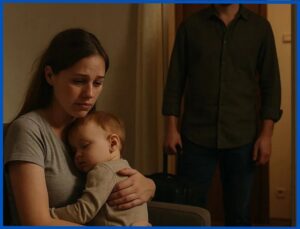My Husband Walked Away After Our Son’s Diagnosis—But I Stayed, Because My Child Needed Me

The doctor’s words came in fragments—medical terms, percentages, phrases that blurred together like static. My mind refused to hold them, until one sentence landed like a knife:
“Your son will never speak. Not now, not ever.”
The sterile white office seemed to spin. My son slept against my chest, tiny and fragile, his breath warm and steady. I clutched him tighter, as if my arms alone could rewrite his future, erase the verdict, mend what science said could not be repaired.
He would never say “Mama.”
Never ask me why the rain falls.
Never share his dreams.
It felt like the ground had vanished beneath me.
Before the Diagnosis
When I was pregnant, my husband Anton was radiant with joy. He spoke to my belly every night, telling our baby how strong he would be, how smart, how loved. We lived simply in a small apartment, but we carried big dreams—of a house, a garden, rooms filled with laughter.
My pregnancy was hard, but Anton never left my side. He held my hand during contractions, slept on hospital benches, and bought everything the doctors prescribed. When our son arrived too early—frail, wrapped in tubes—I thought the hardest part was behind us.
But the months passed in silence. No babbling, no gestures, no eye contact. Doctors told us to wait. At one year—nothing. At eighteen months—still nothing. I spent nights searching forums, desperate for hope, chasing therapies, games, flashcards, massages. Sometimes I thought I saw progress, but silence always returned.
Then came the diagnosis.
When My Husband Left
At first, Anton was furious—at doctors, at fate, even at me. Then his anger gave way to distance. He worked late, avoided home, and stopped looking at his son.
One evening he broke the silence:
“I can’t live like this. I can’t watch him suffer. I can’t do it.”
And just like that, he left. For another woman. A woman whose child spoke, laughed, and called her “Mama.”
I was alone—with my boy, with my grief, with a love that terrified and sustained me all at once.
Life Alone
Our days became a cycle of therapy sessions, medications, sleepless nights. His cries were not tantrums but pleas—his only language. I worked online at night to pay bills, surviving on little sleep and endless determination.
To the world, I was no longer a wife, daughter, or friend.
I was a caregiver. His anchor. His entire world.
People stared in public. Some whispered cruel things—“Why do they have children like that?” Others dismissed us outright: “Don’t hope for miracles. Accept reality.”
But how could I accept it when his smile lit up my darkest hours?
A Lifeline
At a bus stop one morning, as I struggled with a screaming child, a kind woman asked: “Can I help?”
Her name was Vera. She had a teenage son with severe disabilities. He had never spoken, but he communicated—through gestures, through devices, through love.
She told me something that changed me:
“Normal is what we create ourselves.”
Vera became my friend, my guide. She showed me alternative communication tools—cards, apps, buttons. Most importantly, she never pitied me. She believed in my strength when I couldn’t.
Finding Meaning in Pain
Through online groups, I began sharing our journey. Some mothers told me they had considered leaving—but stayed after reading my words. Others thanked me for speaking without self-pity.
I realized that my pain carried purpose. If my story could keep even one mother from giving up, then our silence was not in vain.
Because silence, too, can become a voice.
A New Kind of Language
My son will never form words with his lips, but he speaks every day. With his eyes. With his laughter. With the way he strokes my face when I cry.
He’s learned gestures, learned to press buttons on a tablet:
“I’m hungry.”
“Let’s play.”
“Mama.”
And then one day, he pressed three words in a row—words that shattered me, not with pain, but with joy.
Choosing Love
Anton’s absence no longer fills me with anger. Sometimes sadness. Sometimes pity. But I let go of bitterness—for my own sake, and for my son’s.
Now when I look in the mirror, I see a woman aged by exhaustion, yes—but also a woman who stayed. Who fought. Who chose love over escape.
If someone offered me a painless life without him, I would refuse. Because he is my life.
We mothers of children with silent voices—we are not weak. We are the ones who remain when others walk away. We carry worlds on our shoulders, yet still find ways to love fiercely.
And to any mother reading this who feels alone: you are stronger than you know. You will endure. Because you are a mother. And that is the greatest strength in the world.
✨ Note: This story is a work of creative retelling, inspired by experiences shared by real parents. All names and details have been changed for privacy. Images are illustrative only.